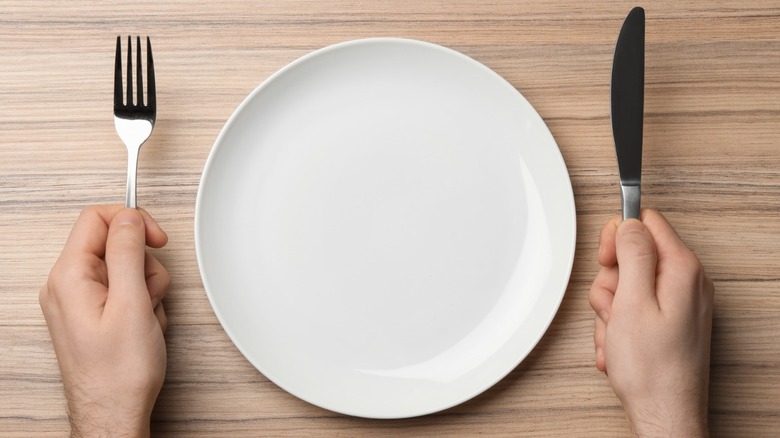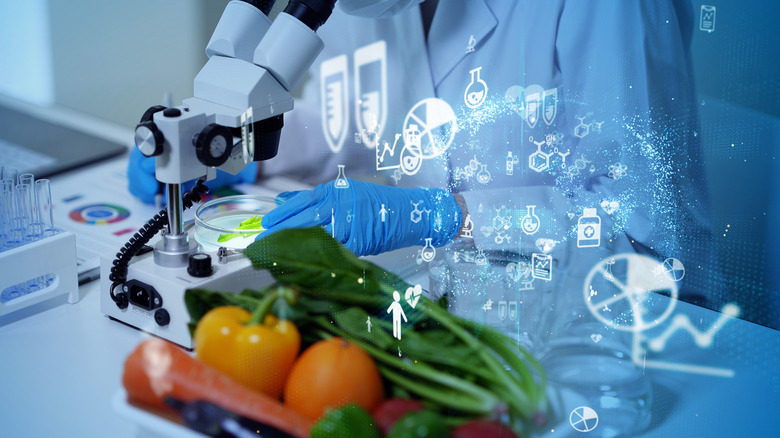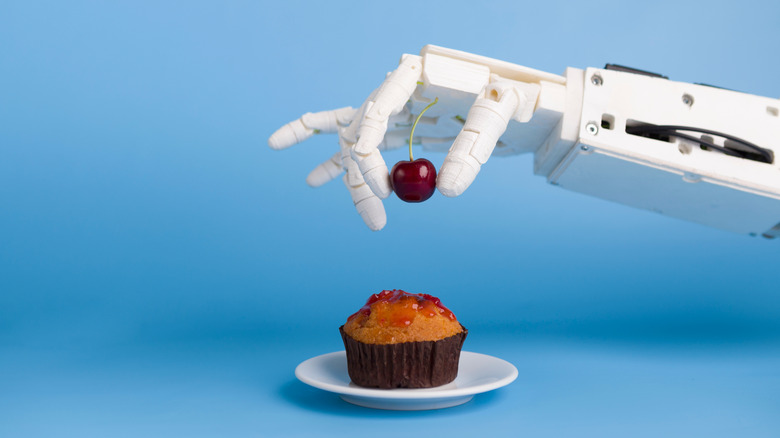What Dinner Could Be Like In 100 Years
Envisioning the future of food is a fun and fascinating premise. From scientific breakthroughs and modern cooking vessels to high-tech kitchens and science-engineered products, the cuisine of the coming decades could be a rich and diverse tapestry of amazing changes and inventions. After all, the air fryer or "sausages" made of plants may not have been a figment of our ancestors' imagination, so who knows what might be developed in the next century?
When we talk about "the future" of food, our minds may conjure up sci-fi-inspired, Jetsons-esque images of machines cooking our pasta or crops growing in outer space. However, a more purposeful re-imagination of our food systems may instead be rooted in ethics and sustainability, rather than state-of-the-art refrigerators or robots serving dinner, some say. Here's what our culinary future might really look like, as explained by scientists, journalists, and other experts.
Get ready for lab-grown meat
In a conversation on food journalist Alicia Kennedy's podcast, LinYee Yuan ponders how to best approach the future of food, wondering if, instead of prioritizing high-tech solutions, we should instead look to "older models of producing nutrients." Yuan is the founder and editor of MOLD, a publication exploring solutions to "the coming food crisis" and feeding the global population fairly. Yuan says, "I think these questions are much more interesting than saying, 'OK, lab-grown meat or salad greens grown hydroponically is the only answer for the future of food,'" suggesting that the solutions can be found by considering the past.
Others say lab-grown meat is definitely the future. Bon Appétit anticipates that within the next decade, cell-based meats that are born from a living animal and then cultivated in a lab will be especially prevalent. This is a plus not only for vegans, but also for sustainability, since "these proteins don't need room to graze and expel methane, don't waste uneaten parts of an animal, and are less likely to contain bacteria like salmonella." They also don't need to be killed for food. In Amanda Little's "The Fate of Food," Uma Valeti, co-founder of UPSIDE Foods (a company developing lab-grown meats), states that cell-based meats could significantly reduce greenhouse gas emissions and water usage (via Rolling Stone). These products are a far cry from the vegetarian offerings that were grocery stores even just a decade ago.
The real goal for future food systems
Bon Appétit also reports that, come the 2040s, experts predict a rise in "personalized nutrition," or a sort of "23andMe" for individuals' nutritional needs. A user-friendly app to immediately determine what you need for better gut health, hydration, allergy management, and more? Sign us up. The kitchen of 100 years from now, meanwhile, may include cell-grown cheese and "3D-printed tortilla chips" instead of the nachos you know today.
If these technological advancements are freaking you out a bit, know that "The Fate of Food" author Amanda Little believes the main goal of future food systems will be to address climate change, which will need to be done through both innovative technology and the generations-old learnings of farmers, explains The Washington Post. "We have the tools, the knowledge and the resources to build a food system that better serves every eater today and long into the future," the review concludes, determining that we already have many of the answers to our question of how to feed every person in the world more fairly and sustainably. Many countries are already engaging in ideas put forward by the United Nations for its Zero Hunger by 2030 goal, such as food waste prevention and regenerative agriculture. If these solutions work, the future of food could include not only hydroponic veggies and delicious vegan sushi, but also a population in which no one suffers from food insecurity.


